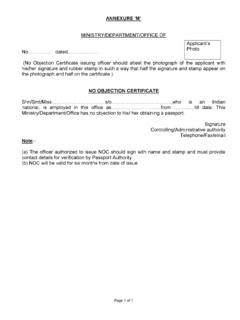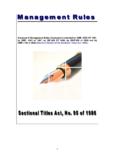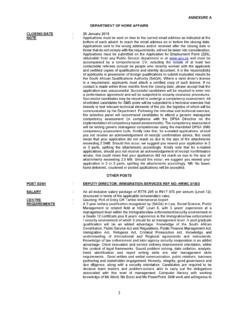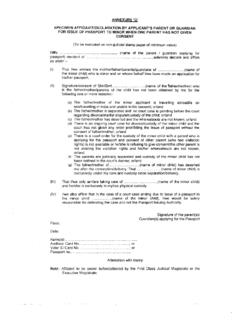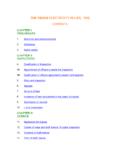Transcription of ANNEXURE 3: Occupational Categories 1. …
1 ANNEXURE 3 of the Regulations to the Employment Equity ActEEA 10 49 ANNEXURE 3: Occupational Categories Employment Equity Act 55 of 1998 PLEASE READ THIS FIRST WHAT IS THE PURPOSE OF THIS ANNEXURE ? This ANNEXURE provides a summary of definitions for Occupational Categories which may be used by employers when completing forms EEA 2 and EEA 4. INSTRUCTIONS Each Occupational category contains a description and illustrative list of occupations that may be included in that category. The complete guideline to Occupational Categories may be obtained from Statistics SA. 1. Legislators, Senior Officials and managers This group includes occupations whose main tasks consist of determining and formulating policy and strategic planning, or planning, directing and co-ordinating the policies and activities of the organisation in the private and public sectors, determining and formulating laws and for directing and controlling the functions of the organisation.
2 Includes: chief executive officer; president; vice-president; chief operating officers; general managers and divisional heads, managers who provide the direction of a critical technical function; postmaster; superintendent; dean and school principal etc. 2. Professionals This group includes occupations whose main tasks require a high level of professional knowledge and experience in the fields of physical and life sciences, or social sciences and humanities. The main tasks consist of increasing the existing stock of knowledge, applying scientific and artistic concepts and theories to the solution of problems, and teaching about the foregoing in a systematic manner. Includes: engineers (civil, mechanical, chemical, electrical, petroleum, nuclear, aerospace, etc.); architects; lawyers; biologists; geologists; psychologists; accountants; physicists, system analysts; assayers; valuators; town and traffic planners etc.
3 3. Technicians and Associate Professionals This group includes occupations whose main tasks require technical knowledge and experience in one or more fields of the physical and life sciences, or the social sciences and humanities. The main tasks consist of carrying out technical work connected with the application of concepts and operational methods in the above-mentioned fields and in teaching at certain educational levels. Includes: computer programmers; nurses; physio-and- Occupational therapists; draftsmen/women; musicians; actors; photographers; illustrating artists; product designers; radio and television announcers; translators and interpreters; writers and editors; specialised inspectors and testers of electronic, electrical, mechanical, etc. products; vocational instructors; technicians (medical, engineering, architectural, dental, physical science, life science, library, etc.)
4 ; pilot; broker; designer; quality inspector etc. ANNEXURE 3 of the Regulations to the Employment Equity Act EEA 10 50 4. Clerks This group includes occupations whose main tasks require the knowledge and experience necessary to organise, store, compute and retrieve information. The main tasks consist of performing secretarial duties, operating word processors and other office machines, recording and computing numerical data, and performing a number of customer orientated clerical duties, mostly in connection with mail services, money-handling operations and appointments. Includes all clerical work, regardless of difficulty, in which the activities are predominantly non-manual. Includes: bookkeepers; tellers; cashiers; collectors (bills and accounts); messengers and office helpers; office machine operators; mail clerks; typists; telephone operators; electronic data processing equipment operators; clerks (production, shipping and receiving, stock, scheduling, ticket, freight, library, reception, travel, hotel, personnel, statistical, general office); secretaries etc.
5 5. Service and Sales Workers This group includes occupations whose main tasks require the knowledge and experience necessary to provide personal and protective services and to sell goods in shops or markets. The main tasks consist of providing services related to travel, housekeeping, catering, personal care, protection of individuals and property, and maintaining law and order, or selling goods in shops or markets. Includes: attendants (hospital and other institutions, including nurses aides and orderlies); barbers; bartenders; guides; food and beverage serving occupations; housekeepers; childcare occupations; conductors; fire-fighters; police offices; advertising agents; real estate agents; sales workers and sales clerks; shop attendants; stock brokers; insurance brokers; travel agents; sales people of technical and business services; etc. 6. Skilled Agricultural and Fishery Workers This group includes occupations whose main tasks require the knowledge and experience necessary to produce farm, forestry and fishery products.
6 The main tasks consist of growing crops, breeding or hunting animals, catching or cultivating fish, conserving and working forests, and selling agricultural and fishery products to purchasers. Includes: farmers; growers; planter; viticulturists; winemakers; skilled horticultural workers; greenkeepers; skilled fishermen/women etc. 7. Craft and Related Trades This group includes occupations whose main tasks require the knowledge and experience of skilled trades and handicrafts which, among other things, involve an understanding of materials and tools to be used, as well as all stages of the production process, including the characteristics and the intended use of the final product. They are frequently journeymen/women who have received an extensive period of training The main tasks consist of extracting raw materials, constructing buildings and other structures and making various products, as well as handicraft goods. Includes: miners; quarriers; stoneworkers; bricklayers; stonemasons; carpenters; shopfitters; plasterers; plumbers; electricians; painters; mechanics; glass-makers; locksmiths; sheet metal workers; etc.
7 ANNEXURE 3 of the Regulations to the Employment Equity Act EEA 10 51 8. Plant and Machine Operators and Assemblers This group includes occupations whose main tasks require the knowledge and experience necessary to operate and monitor large-scale and often highly automated industrial machinery and equipment. The main tasks consist of operating and monitoring of mining, processing, and production machinery and equipment, as well as driving vehicles and driving and operating mobile plant, or assembling products from components. Includes: truck and tractor drivers; bus drivers; paving, surfacing and related occupations; roofers; photographic processors; sound and video recording equipment operators; those in apprenticeship training; textile workers; production machine workers etc. 9. Elementary Occupations This group covers occupations which require relatively low/elementary levels of knowledge and experience necessary to perform mostly simple and routine tasks, involving the use of hand held tools and in some cases considerable physical effort, and, with few exceptions, limited personal initiative and judgement.
8 The main tasks consist of selling goods in streets, door-keeping and property watching, as well as cleaning, washing, pressing, and working as labourers in the fields of mining, agriculture and fishing, construction and manufacturing. Includes: news and other vendors; garage attendants; car washers and greasers; gardeners; farm labourers; unskilled railway track workers; labourers performing lifting, digging, mixing, loading, and pulling operations; garbage collectors; stevedores; sweepers; charworkers etc.
